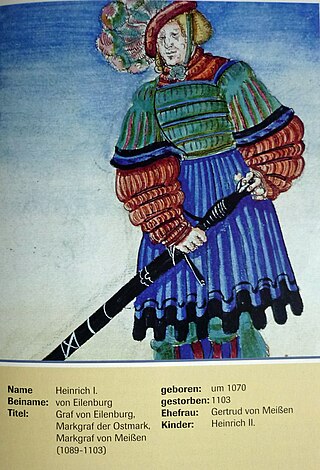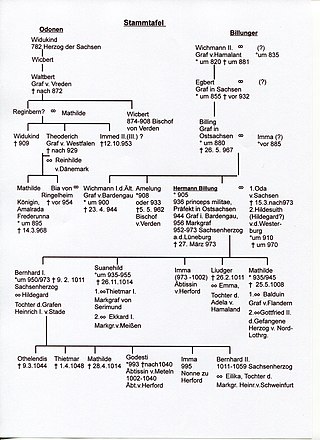Related Research Articles

Year 1023 (MXXIII) was a common year starting on Tuesday of the Julian calendar.

Hermann Billung was the margrave of the Billung March from 936 until his death. The first of the Saxon House of Billung, Hermann was a trusted lieutenant of Emperor Otto I.

Henry III, called Henry the Illustrious from the House of Wettin was Margrave of Meissen and last Margrave of Lusatia from 1221 until his death; from 1242 also Landgrave of Thuringia.
Theodoric I, called the Oppressed, was the Margrave of Meissen from 1198 until his death. He was the second son of Otto II, Margrave of Meissen and Hedwig of Brandenburg.

Henry I, nicknamed the Old, a member of the House of Wettin, was Count of Eilenburg as well as Margrave of the Saxon Eastern March from 1081 and Margrave of Meissen from 1089 until his death.

Eckard I was Margrave of Meissen from 985 until his death. He was the first margrave of the Ekkehardinger family that ruled over Meissen until the extinction of the line in 1046.

Herman I was Margrave of Meissen from 1009 until his death.
Otto II, the Rich, a member of the House of Wettin, was Margrave of Meissen from 1156 until his death.
Oda of Meissen, also named Ode, Old High German form for Uta or Ute, was a Saxon countess member of the Ekkehardiner dynasty. She married Piast Duke Bolesław I the Brave as his fourth and last wife.

Hedwig of Brandenburg, also called Hedwig of Ballenstedt, a member of the House of Ascania, was Margravine of Meissen from 1156 until 1190 by her marriage with Margrave Otto II.
The German royal election of 1002 was the decision on the succession which was held after the death of Emperor Otto III without heirs. It was won by Duke Henry IV of Bavaria among accusations of uncustomary practices.
Volkold of Meissen was the second Bishop of Meissen.
Eido II, was Bishop of Meissen from 1040 to 1045 or 1046.
Bruno I of Meissen was Bishop of Meissen from 1046 to 1065.
Godebold of Meissen, was Bishop of Meissen from 1119 to 1140.

Swanehilde of Saxony was Margravine of Meissen.
Martin was Bishop of Meissen from 1170 to 1190.
Withego von Furra or de Wuor, otherwise Withego I of Meissen or Withego I von Furra was Bishop of Meissen from 1266 to his death.